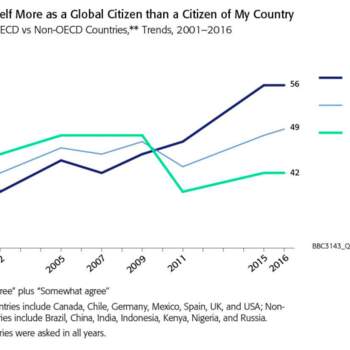The Occupy movement
In September 2011 protesters assembled to ‘occupy’ a park near Wall Street in New York City, the financial centre of the United States and beyond. These protests were aimed to address the unequal distribution of wealth and the perceived failure of politicians to regulate profit-seeking multinational corporations. In a 2012 publication about the movement and its impact, NCDO researchers linked it to protests in Egypt, Spain, and Israel during the same year. These protests were characterised as ‘bottom-up’ movements that shared ‘a collective identity’ rooted in addressing wealth inequality. The use of 'new' social media platforms facilitated the amplification of solidarity with the Occupy movement and other socio-economic movements.
In cities worldwide, including Amsterdam and The Hague, ‘Occupy-ers’ took the streets as part of the movement. According to the 2012 NCDO report, only 28% of Dutch people supported the action of the Occupy-ers, although 68% agreed with their message and believed in the need for further wealth redistribution. The research also revealed the resurgence of the phrase “Think globally, act locally,” originally popularised in the 1960s, as it became relevant once again.
Kaleidos Research: ‘Nederlanders en de Wereld’
In 2012 Kaleidos Research, part of the NCDO, conducted a study titled ‘Dutch people and Global Citizenship.’ The research aimed to assess the extent to which Dutch individuals above the age of 18 years old exhibited behaviours aligned with global citizenship. Prior to 2011, the NCDO annually published the ‘International Cooperation Barometer’, which examined public support for development cooperation within Dutch society. However, since then the NCDO underwent a transformation from an organisation primarily focused on fostering support for development cooperation to a knowledge and advisory centre for global citizenship in the Netherlands. ‘Dutch people and Global Citizenship’ marked the NCDO's first report on global citizenship in its new role.
The report (A15553 in the physical collection of NICC) emphasises the importance of individual contributions to the sustainability of the world in the concept of 'global citizenship.' The researchers not only examined the level of support for international cooperation, but also analysed how citizens' actions and sentiments regarding global issues. The publication focused on 9 issues pertaining to the sustainability of society (related to social and economic justice) and nature (related to sustainability). The topics are the following:
- Saving water and energy
- Mobility
- Recycling and waste
- Consumer behaviour
- Looking for information and giving your opinion on global issues
- Political participation
- Donations to charities
- Volunteering
The NCDO definition of global citizenship as formulated in the 2012 report, can be translated as follows: “the global dimension of citizenship is reflected in behaviour that recognises the principals of mutual interdependence, the equity of people, and the shared responsibility for addressing global challenges.”
Under the name ‘Dutch People and the World,’ this annual publication aimed to delve into the perceptions of Dutch individuals regarding international issues and solidarity. The last edition of this report was published in 2016, as Kaleidos ceased its operations the following year.
Attitudes towards Global Citizenship
In 2001, GlobeScan started conducting a yearly poll for the BBC World Service looking at whether people perceive themselves as global citizens. In 2016, for the first time since tracking began, half (51%) of people tracked across 18 countries see themselves more as global citizens than citizens of their respective countries. Interestingly, in industrialised OECD countries post-2008 there has been a decline in people identifying as global citizens, with Germany hitting a low of 30% of respondents perceiving themselves as global citizens. In contrast, in non-OECD countries self-identification as global citizens has mostly increased, with highs in Nigeria (73%), China (71%), India (67%), and Peru (70%). See more here.
Sources and further reading:
- Brown, G. (2016). The Universal Declaration of Human Rights in the 21st century: A living document in a changing world (p. 146). Open Book Publishers.
- Irene de Goede, Jacquelien van Stekelenburg, Christine Carabain (2012), Nederlanders en de Occupy-beweging. E00011 in the NICC collection.
- NCDO (2012). Nederlanders en Mondiaal Burgerschap. E00134 in the NICC collection.
Further listening:

